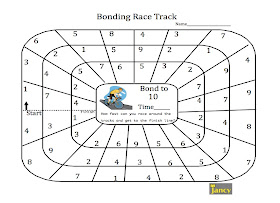
Why Bonding?
*Builds on fact families so the students can make sense of number combinations and become fluent.
*Helps students compose and decompose numbers.
*If children memorize number 0-12 they will have difficulty multiplying larger numbers and finding factors.
*Students foundation crumbles if it is based on memorization. Greg Tang
 |
| Free on Teachers Pay Teachers |
Early Grades
In early grades k-1 students learn their bonds of 5 and 10. (K.0A.4)
In early grades k-1 students learn their bonds of 5 and 10. (K.0A.4)
This is a concrete way
to show part-part whole relationships using any kind of manipulatives. Pictorial helps students visualize, and bonding
bridges the gap to the algorithm.
Bonding also helps students see the different fact families.
Bonding also helps students see the different fact families.
 |
| I have a Ten Card over my desk! |
In first grade students are required to add and subtract fluently within 20. (1.0A.6) If students have instant recall of number combinations/bonds 2 + 8 = 10. They are able build on the bonding concept that 5 + 8 = 13.
 |
| This is a concrete way to teach bonding. Once students see bonding this way, it helps them become more fluent when adding the algorithm. |
Greg Tang's site has many free concrete activities to teach bonding. He also has worksheets like the one below to get the students practicing bonding without the manipulatives.
Greg Tang believes to move students from concrete to algorithm quickly, so you can to get them to think abstractly. "Games are the perfect way for kids to practice and extend their math skills. Smart Sums dice games teach kids to use the Make 10 addition strategy to add quickly and efficiently rather than count or memorize." Greg Tang http://gregtangmath.com/Apps/AppDataAuthorizedOnly/Materials/Downloads/Puzzles/Dice.Add.Make10.pdf  |
| Greg Tang has some very good worksheets to help reinforce bonding. |
Smartboard Activity-Roll
the dice. Students find bonds to 10 (or 5) and show the answer on
their whiteboards. The first person to show the correct answer will
roll the dice the next time. If you do not have dice have the students
work in partners and find the bonds to 10.
My students love this activity. For younger students start out with less dice. It really helps them practice and improve their bonding and subitizing. My students show their answers on whiteboards.
I tell my students "10 is our friend." 10, 20, 30 etc. are (friendly numbers)
|
In Third grade students fluently add and subtract with 100 using strategies based on place value, properties of operations, and or the relationship between addition and subtraction. (2NBT.5)
When my students are confident with bonding to 10 and bonding to 10-90 and adding the rest-we start to bond to 100. I will say, "38-bond to 100." The students think... 38 bond to a friendly number then add the rest. They show the correct number on their whiteboards. After they visually see it with the abacus they become very good at doing this activity mentally. We use this mental math activity throughout the year.
Teach Pictorial
We have found that some of our students struggle with bonds to 100. Here is another way bonding can be taught. Students fill in the amount 33. Ask 33 bond to a friendly number...(40) They fill in to 40 with a different color. Then add the rest...(60) Fill in with the same different color.
FREE on TeachersPayTeachers!!!
The
SmartBoard Presentation below has ENGAGING activities (some shown
above) with instructions of how you can strengthen your students' Number
Sense using Bonding & Mental Math Strategies-(2nd-5th). Your
students will also be Subitizing with the dice activities.
 |
| TeacherspayTeachers (JANCY) This is a Free Bonding Race Track on TPT and it is also in the Mental Math-Bonding Presentation on TPT. 
STRATEGY :
This is one example of a quick bonding activity to help students become fluent with their bonds to ten and hundred. Students use mental math strategies to quickly bond to 100. There are two on my TPT site. The first one is a ten bonded to 100. Example: 10 + _____=100 It is very engaging as the students try to hurry around the track and make it to the finish line. |
 |
| http://www.teacherspayteachers.com/Product/NUMBER-BONDS-TO-100-RACE-TRACK-835023 |









Thanks for sharing your blog! It is very informative!
ReplyDelete